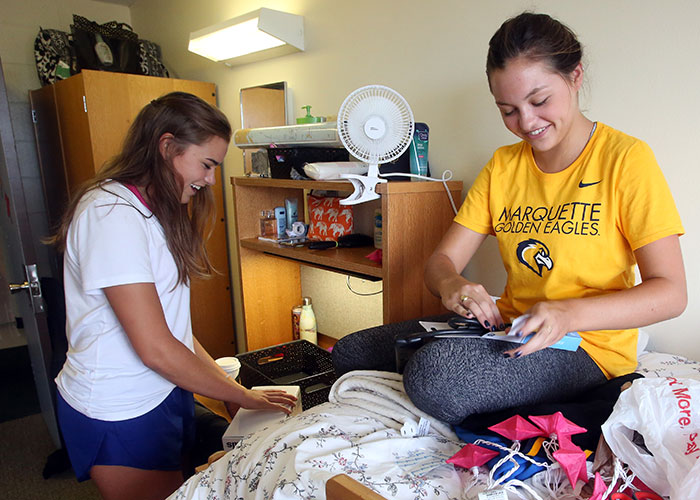Community Development Model
Purpose of Community Development
Community development initiatives strive to foster reflective, meaningful and authentic dialogue among community members in the residence halls in order to form men and women for and with others through transformational and inclusive learning.
Community development is arguably one of the most important jobs of every RA on the Marquette campus. The Office of Residence Life believes that everything the RAs do in their position stems from building community, which is why our departmental mission statement is called the Philosophy of Community.
The Office of Residence Life model strives to support the educational mission of Marquette University to educate the whole person and put student formation and learning at the heart of the work in Residence Life. Students who live in the residence halls have a unique opportunity to interact and build relationships with others that will ultimately promote learning if students are challenged to engage in dialogue and reflect on experiences with others. Our Residential Curriculum is grounded primarily in Ignatian Pedagogy which “relates student learning and growth to personal interaction and human relationships” (Thon, 2013, pp. 37).
The Residential Curriculum contains several different educational strategies employed in the residence halls, below are our most prevelant strategies:
- Individual Conversations – RAs will have one-on-one conversations with residents multiple times throughout the course of the year to get to know students as individuals, help them process and reflect on the experiences that they are having, and evaluate how the year has gone.
- Floor Meetings – RAs host meetings meetings at important moments throughout the year. These meetings provide opportunities for residents to gather to facilitate consistent group interaction and dialogue, discuss community norms and expectations, and recieve important information in a timely manner.
- Roommate Agreements – RAs will promote dialogue among each set of roommates by facilitating a roommate agreement meeting. This meeting will help roommates to learn about each other, communicate their needs, and manage conflicts that could occur. Residents complete a roommate agreement they sign and can refer back to when conflicts arise.
- Community Nights– Throughout the semesters, our residence halls provide many social opportunities for residents to gather. RAs host multiple floor community nights each semester to foster floor community, while Community Programming Councils provide hall wide opportunities with regular all hall community nights. These experiences help residents connect with experiences upon which they can reflect, learn, and connect to larger communities by promoting and attending hall and campus events with residents throughout the year.
Thon S.J., Andrew J (2013). The Ignatian Imperative: Student Affairs Educations in Jesuit Higher Education. Milwaukee, WI: JASPA, AJCU, Marquette University College of Education

